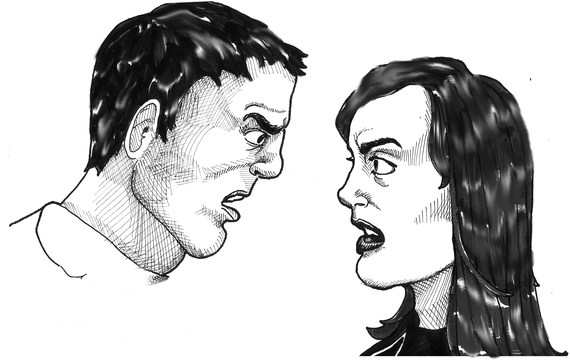
You have concerns about the quality or health of your relationship. Maybe you feel bossed around, not as free as you'd like, sometimes even insulted or humiliated. On bad days, you wonder what you're doing together. But you remember good times and even now, on occasion, you feel loved. Your partner has probably told you that you are the problem, and you may wonder if it is true. A careful assessment will help you see what's going on--then you can decide what to do about it.
Below are a series of questions about some of the controlling behaviors you may have experienced. (For a more complete list, please click here). Unhealthy domination by a partner is called coercive control. It's more than just occasional nastiness or bossiness--it affects several areas of your life and causes you to change your behavior to keep the peace. You may be so accustomed to some items on this list, they just feel like "the way it is." Other items may seem extreme, and you may be relieved to realize that you do not face all of them:
•Does your partner try to isolate you and keep you away from other people?
•Does your partner try to keep you from leaving the house, joining organizations, working, or furthering your education?
•Does your partner limit or monitor your phone conversations, social media use, email, or mail?
•Does your partner try to find out what you have done and where you have been in a way that feels like "too much?" Does your partner spy on you or stalk you? (Drawing by Liz Bannish)
(Drawing by Liz Bannish)
•Does your partner try to control your personal activities, such as your hobbies and interests and what you wear?
•Does your partner try to control your access to resources such as money or transportation?
•Does your partner make you feel afraid by shouting, swearing, name-calling, or insulting you? In coercive control, this is one-sided and frequent or extreme.
• Does your partner try to control aspects of your health or body in ways that are harmful to you, such as making demands regarding your: eating or weight, sleeping, bathing, or using the bathroom? Does your partner try to block you from taking prescription drugs that you need, going for medical care, seeing a therapist, or exercising?
•Does your partner push you to use substances such as street drugs, prescription drugs for nonmedical reasons, or more alcohol than you want?
•Does your partner push you to change your body in ways you'd rather not, such as getting tattoos or piercings or cosmetic surgery?
•Does your partner push or force you sexually, and are you unable to speak your mind about sex? Does your partner push you to avoid practicing safe sex? Does your partner push you to take sexual pictures or videos?
•Does your partner block your efforts to separate or leave the relationship?
•Does your partner block your efforts to speak about things that matter to you?
•If you have children in your lives, does your partner try to control or harm your relationship with the children?
•Does your partner throw, kick or punch things, slam doors or stomp around to intimidate you? Does your partner grab or push you, get in your face, corner you, or pin you against a wall?
•Does your partner refuse to speak with you for long periods of time?
•Does your partner threaten you?
•Does your partner hurt you physically? Does your partner threaten you with guns or other weapons? Does your partner threaten suicide?
•Does your partner punish you or deliberately harm you?
If you answered "yes" to any of the above questions, which ones are the most upsetting to you? Which frighten you the most? If you have answered "yes" to some but not all, you may still be in a relationship of coercive control. For instance, some people control their partners without physical violence.
Not all the questions on this list are created equal. Responding "yes" to one question, such as "Does your partner threaten you?" may be enough reason for you to end your relationship today. Responding "yes" to a question about whether your partner tries to control what you eat or how you spend money may not. Or it may. Only you can decide the reasons to maintain or end the relationship.
There is no one right way to score this list. Unfortunately, you cannot simply add up the items, arrive at a total and say to yourself, "My relationship is okay" or "My relationship is overly controlling and I have to change it" or "I must end this relationship." These decisions are too individual for that kind of numerical process. But I hope these questions help you think about whether you're a victim of coercive control. Then, you can decide what to do next.
Many people stick with their partners for months, years and decades, waiting for them to change. Remember, past behavior is the best predictor of the future. Without some intense intervention, most controlling partners will not change. Try to be hopeful about the possibility of freedom in your future, whether that freedom takes the form of improving or ending the relationship.